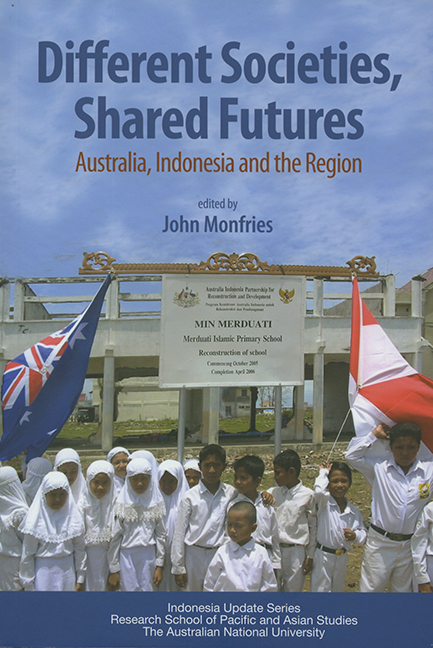Book contents
- Frontmatter
- Dedication
- Contents
- Tables
- Figures
- Contributors
- Acknowledgments
- Opening Address by Richard Woolcott AC
- 1 Introduction
- PART I Regional Viewpoints
- PART II Security Aspects
- 5 The New Australia–Indonesia Strategic Relationship: A Note of Caution
- 6 The War on Terror: The Primacy of National Response
- PART III Mutual Perceptions and Irritations
- PART IV The Economic Partnership: Aid, Economics and Business
- PART V Conclusion
- Glossary
- References
- Index
6 - The War on Terror: The Primacy of National Response
from PART II - Security Aspects
Published online by Cambridge University Press: 21 October 2015
- Frontmatter
- Dedication
- Contents
- Tables
- Figures
- Contributors
- Acknowledgments
- Opening Address by Richard Woolcott AC
- 1 Introduction
- PART I Regional Viewpoints
- PART II Security Aspects
- 5 The New Australia–Indonesia Strategic Relationship: A Note of Caution
- 6 The War on Terror: The Primacy of National Response
- PART III Mutual Perceptions and Irritations
- PART IV The Economic Partnership: Aid, Economics and Business
- PART V Conclusion
- Glossary
- References
- Index
Summary
Until the late 1980s, the Association of Southeast Asian Nations (ASEAN) was often described as a success in managing regional security. However, this positive image changed quickly with the end of the Cold War, and ASEAN was soon seen as a regional organisation in need of new meaning and relevance. Talk about the declining role of ASEAN – in terms of both intramural cooperation and extra-mural relations – began to grow stronger and louder after the region was swept by financial crisis in 1997. With the world now confronting the challenge of overcoming terrorism, ASEAN is under even greater pressure to prove itself as an organisation worthy of existence, and still relevant.
As a regional organisation in a part of the world that has been dubbed the ‘second front’ in the war against terror, ASEAN is understandably expected to play an important and active role in combating terrorism. However, it is precisely on this front that current criticisms of ASEAN have been directed. It has been asserted, for example, that ‘the ASEAN approach against international terrorism might be viewed as slow, incremental, and turgid particularly in addressing and containing the growth of Islamic extremism in the region’ (de Castro 2004: 208). It has been stated also that ‘ASEAN as an organization has done relatively little to coordinate the substantial counterterrorism efforts of its member states’ (Dillon and Pasicolan 2002: 1) And ‘even after the bombing of the Sari Club in Bali in October 2002, there was little substantial counterterrorism cooperation among the ASEAN states’ (Chow 2005: 302). In short, criticism of ASEAN since 11 September 2001 has focused on ‘the lack of meaningful and substantial cooperation’ in the war against terrorism at the regional level, which ‘would not only strengthen the currently operating terrorist organizations, but also open up the possibility for new organizations to operate from Southeast Asia’ (Swanström 2005: 11).
- Type
- Chapter
- Information
- Different Societies, Shared FuturesAustralia, Indonesia and the Region, pp. 54 - 66Publisher: ISEAS–Yusof Ishak InstitutePrint publication year: 2006



